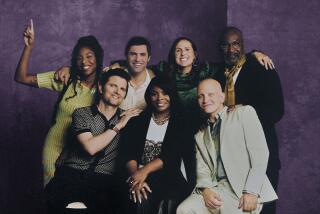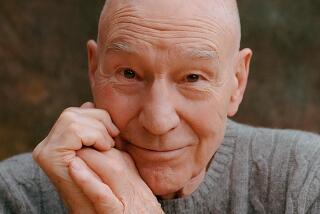After ‘Twin Peaks,’ a Climb Back to TV
“Twin Peaks” burst onto the television scene in 1990 with more heat than a cup of damn fine coffee, launching that phrase and the burning question “Who killed Laura Palmer?” into the national lexicon.
“Peaks freaks” sipped coffee and munched cherry pie at viewing parties, made pilgrimages to the town of Snoqualmie, Wash., where the show filmed exterior shots, published newsletters, used a then-nascent medium called the Internet to communicate and speculated madly about every nuance of the series.
Television critics and media outlets joined in the guessing game regarding who murdered the small-town homecoming queen. The body of Laura Palmer, played by Sheryl Lee, even graced the cover of Esquire magazine as its “woman of the year.”
This season, in a coincidence the show doubtless would have imbued with some more profound meaning, “Twin Peaks” alumni are staging a prime-time reunion.
Co-stars Lee, Madchen Amick and Sherilyn Fenn are all featured in series that will premiere as part of the new TV season. A fourth “Peaks” graduate, Lara Flynn Boyle, returns to ABC’s “The Practice,” and Moira Kelly, who substituted for Boyle as Laura’s best friend Donna Hayward in the 1992 feature film prequel “Twin Peaks: Fire Walk With Me,” stars in the fledgling CBS series “To Have and to Hold.”
Even series co-creator Mark Frost is serving up his own new drama, CBS’ “Buddy Faro,” featuring Dennis Farina as a notorious private eye. The reunion would have been more crowded had Fox not rejected a proposed revival of “The Invisible Man” with Kyle MacLachlan, the show’s Agent Dale Cooper. (Some may also remember “The X-Files’ ” David Duchovny playing a cross-dressing FBI agent in a few episodes.)
Those associated with the quirky serial recall the frenetic period after its premiere on April 8 with both fondness and amazement at the stir the program caused.
“I don’t think anything could have prepared us for the blood-in-the-water frenzy,” said Frost, a former “Hill Street Blues” writer who was brought together with Lynch--the director of such films as “Blue Velvet” and “Eraserhead”--through their representatives at Creative Artists Agency.
“It was bizarre. I saw an old friend, and he said, ‘It must have been like being in the Beatles there for a while.’ It wasn’t that crazy, but it did get pretty strange.”
So strange that Fenn, on a trip to New York, found herself mobbed on the street by people yelling the name of her flirtatious character, Audrey Horne, and asking who the killer was. Amick recalls being offered advice about battered women because her alter ego, the set-upon waitress Shelly Johnson, had an abusive husband.
The furor was probably most remarkable for Lee, a then-21-year-old Seattle student originally hired for a week’s work playing a corpse.
“I was just this kid from Colorado studying theater, and suddenly I was on a hit TV show,” she said, noting that people who recognized her at times reacted as if they’d seen a ghost. “In some ways, my naivete saved me.”
Fenn--who stars in Showtime’s dark comedy series “Rude Awakening,” which premieres Aug. 1, as a woman struggling with alcoholism--wasn’t optimistic about the show’s chances.
“When I saw the pilot, I didn’t even think it was going to go beyond that,” she said. “I thought, ‘Geez, I don’t even know what’s going on half the time.’ ”
“I knew David Lynch going to television was going to be something. It was either going to not work, nobody was going to get it and it would disappear, or it was going to be something special and really stand out,” said Amick, a mysterious resident of “Fantasy Island” in the revised version that will premiere on ABC in September.
*
“Twin Peaks” made its debut to rave reviews and strong ratings. After opening on a Sunday, it continued Thursdays opposite “Cheers.” The audience gradually dwindled, but ABC was reluctant to cut loose such a talked-about project. The network renewed the program but scheduled it Saturdays--a difficult night to corral its youthful core audience.
In hindsight, Frost concedes there was “a design flaw in the show” that didn’t allow people to come in late or miss episodes along the way and feel they could keep up with the “Dickensian” parade of characters and plot lines.
“The serial nature of ‘Twin Peaks’ was what drove a stake through its heart,” he said.
A first-season cliffhanger also irked some fans by answering fewer questions than it posed, after ABC’s promotional spots suggested the show would resolve the “Who killed Laura?” riddle. (The answer came during the second year.)
Though “Twin Peaks” was canceled in 1991, those involved with the show say its memory has lingered, in part because of the program’s popularity in Hollywood circles.
“It was a big industry show. Even now, I’m still telling stories about what it was like,” Amick said.
*
Many of the younger cast members launched film careers, with Fenn--whose films include “Ruby,” “Diary of a Hitman” and “Boxing Helena”--saying the series “opened many doors that were not open to me” before.
The actors also agree that working with Lynch as a director offered an opportunity rarely matched on subsequent projects.
“It was a good way for me to learn the business,” said Amick, who had modeled and appeared in the original NBC pilot for “Baywatch” (“I was the only one who wasn’t in a bathing suit”) prior to the show.
“It really gave you a sense that you could create and be a part of the creative process, which then, of course, I was very spoiled about. . . . I saw how it should be done, and how positive that is. That’s probably why I did so many independent films after [the show].”
Fenn found the notion of returning to television difficult because of the series.
“I didn’t know what would compare to ‘Twin Peaks,’ ” she said. “I read things, but it was like, ‘Sorry, I was in the most charmed environment. What’s going to measure up to that?’ ”
Frost viewed “Twin Peaks” as a tough act to follow as well--one reason he stayed away from television for a while, writing three novels (among them “The List of 7”) and directing the film “Storyville,” which he co-wrote. Despite his affinity for the series, he didn’t participate in the 1992 film prequel, which Frost called “willfully obscure.”
“I felt going backward in time was a real misstep and a disservice to the people who had followed the show faithfully,” he said.
The film did provide a starring showcase for Lee, who subsequently appeared on Broadway in “Salome” (opposite Al Pacino) and in the movie “Backbeat.” Lee had gotten to act in the series itself only sparingly, with the producers cobbling together a speaking role for her as Laura’s cousin, Madeleine, spurring her move to Los Angeles.
Currently co-starring with Ken Olin in the upcoming CBS drama “L.A. Doctors,” Lee said the “Twin Peaks” experience gave her a “wonderful introduction” to show business that was also “completely surreal”--using adjectives, “wonderful” and “surreal,” that many fans affixed to the show itself.
“It’s still hard to imagine that it was me and it happened in my life,” Lee said. “When I remember it, I feel like I’m watching a movie.”
More to Read
The complete guide to home viewing
Get Screen Gab for everything about the TV shows and streaming movies everyone’s talking about.
You may occasionally receive promotional content from the Los Angeles Times.






